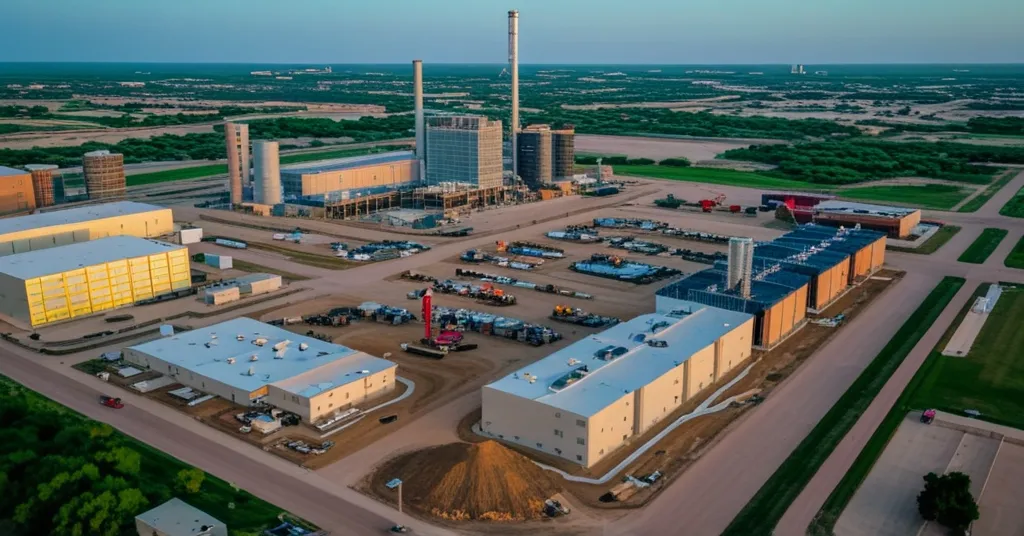Bitcoin Mining Boosts U.S. Economy with 31,000 Jobs, Texas Leads

Bitcoin Mining Creates Over 31,000 Jobs in the U.S., with Texas Leading the Charge
Bitcoin mining has become a powerhouse for the U.S. economy, generating over 31,000 jobs nationwide. Texas, in particular, has embraced this industry, leading the charge with its supportive regulatory environment and infrastructure, and significantly transforming towns like Rockdale into bustling economic hubs.
Key bullet points:
- Bitcoin mining creates over 31,000 U.S. jobs
- Texas at the forefront with job growth
- Jobs span tech, energy, and construction sectors
- Reflects broader blockchain economic impact
Economic Impact
Bitcoin, once viewed as a speculative asset for tech enthusiasts, is now making a substantial contribution to the U.S. economy. According to a report by the Perryman Group, published by the Texas Blockchain Council and The Digital Chamber, Bitcoin mining has led to the creation of over 31,000 jobs across various sectors, including technology, energy, and construction. Bitcoin mining involves using powerful computers to validate transactions and add them to the blockchain, a decentralized public ledger. This process, while energy-intensive, has been a catalyst for economic growth in regions with mining operations.
Texas: A Mining Hub
Texas has become the epicenter of this economic boom due to its favorable regulatory environment and robust infrastructure. The state alone accounts for over 12,200 mining-related jobs. A prime example of this transformation is the conversion of the former Alcoa steel plant in Rockdale into Riot Blockchain’s Whinstone facility, which has added 300 direct jobs and between 900 to 1,200 indirect jobs to the local economy. The facility is also projected to generate over $1 million in sales tax revenue, providing a significant boost to the region.
Barbara Holly, Rockdale’s City Manager, describes the impact as “extremely positive,” underscoring the town’s shift from industrial decline to a new era of growth. “Who would’ve thought that Bitcoin would be the thing to bring Rockdale back to life?” she quips, reflecting on the unexpected revival.
Environmental Concerns
However, Bitcoin mining’s high energy consumption raises valid environmental concerns. Globally, its energy use nearly tripled in 2021 to 204 TWh, which is enough to power over 18 million American homes for a year. In Texas, mining operations currently consume about 3,000 MWs daily, with projections suggesting an increase to 17,000 MWs by 2030. This rapid growth could strain the state’s power grid, a worry echoed by Joshua Rhodes, a researcher at the University of Texas at Austin. He highlights the importance of electricity costs and grid connection speed for miners but warns that the surge in demand might outpace infrastructure development.
Future Prospects and Challenges
Despite these challenges, Bitcoin mining’s economic benefits are undeniable. It can also play a crucial role in energy management through demand response programs, where miners temporarily reduce their power usage to help stabilize the electrical grid during peak demand periods. This symbiotic relationship with energy generation showcases Bitcoin’s innovative potential and aligns with the concept of effective accelerationism, the idea that technological advancement should be accelerated to enhance societal development.
Yet, vigilance is necessary. Bitcoin’s price volatility poses risks to mining operations’ sustainability, which could affect long-term economic benefits. Additionally, while mining drives job growth, its significant energy consumption raises environmental concerns. Exploring alternative energy sources, such as small-scale nuclear reactors, could address these issues while meeting the high energy demands of mining operations and AI data centers.
However, while Bitcoin mining currently fuels job creation, the future might see some of these jobs automated, presenting a double-edged sword that requires careful management.
Key Takeaways and Questions
- What is the impact of Bitcoin mining on the U.S. economy?
Bitcoin mining has created over 31,000 jobs in the U.S., contributing to economic growth and job creation across various sectors.
- Why is Texas leading in Bitcoin mining job creation?
Texas has emerged as a leader due to its supportive regulatory environment and infrastructure conducive to mining operations.
- How does Bitcoin mining contribute to the theme of decentralization?
Bitcoin mining supports decentralization by distributing economic activity and job creation across different regions, reducing reliance on centralized financial systems.
- What are the potential risks associated with Bitcoin mining?
While Bitcoin mining drives job growth, it also consumes significant energy resources, raising concerns about environmental sustainability and energy costs.
- Does the job creation in Bitcoin mining reflect the broader impact of blockchain technology?
Yes, the job creation in Bitcoin mining is indicative of the broader economic impact of blockchain technology, which is driving innovation and growth across multiple sectors.
“Bitcoin mining has not only revolutionized the way we think about money but also significantly boosted the U.S. economy by creating over 31,000 jobs, with Texas at the forefront of this growth.”



